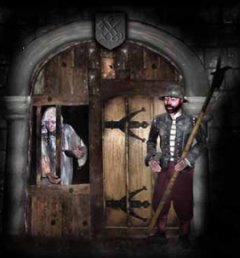 Did you ever wonder about the phrase "the clink?" It's an interesting word we sometimes use for jail, prisons, the hoosegow, the big house, the reformatory, and penitentaries. Somehow it feels a little less fraught with the dark implications of prisons. In fact, The Clink was a notoriously dark and brutal prison.
Did you ever wonder about the phrase "the clink?" It's an interesting word we sometimes use for jail, prisons, the hoosegow, the big house, the reformatory, and penitentaries. Somehow it feels a little less fraught with the dark implications of prisons. In fact, The Clink was a notoriously dark and brutal prison.The Clink was a hellhole in Southwark, England from the 12th century until around 1780. I don't know if Shakespeare ever referred to The Clink or not. I'm too lazy to check. Ok, that's a lie. I just did. And this is a little spooky: "In this light Shakespeare emerges surely as a much more interesting and ambiguous figure, for whom concealment was not only part of his art but part, perhaps, of a deliberate pattern in his life too. It is intriguing, for example, that during 25 years of lodging in London, with as many as eight addresses indicated in our sources, he is never picked up in the church attendance lists, even in places where it was compulsory such as the Liberty of the Clink in Southwark where he lived in 1599 and maybe later. " He may not have writtten about it, but he lived there!
The name may have come from a local manor, the Clink Liberty. Or the Clink Liberty may have been named after the prison. Both manor and prison were owned by the various Bishops of Winchester and was sited right next door to the Bishop's residence.
The Clink was originally used to detain Catholic and Protestant heretics. The Clink was burned down during the Gordon Riots of 1780 and was never rebuilt.
No one is sure where the name originally came from. Or how it was handed down as a synonym for prison. More than one person has suggested that its name is an example of onomatopoeia, referring to the sound made by closing the jail cell's doors. The Clink Prison Museum stands on the original site in Clink Street, in Southwark.
---o0o---
No comments:
Post a Comment